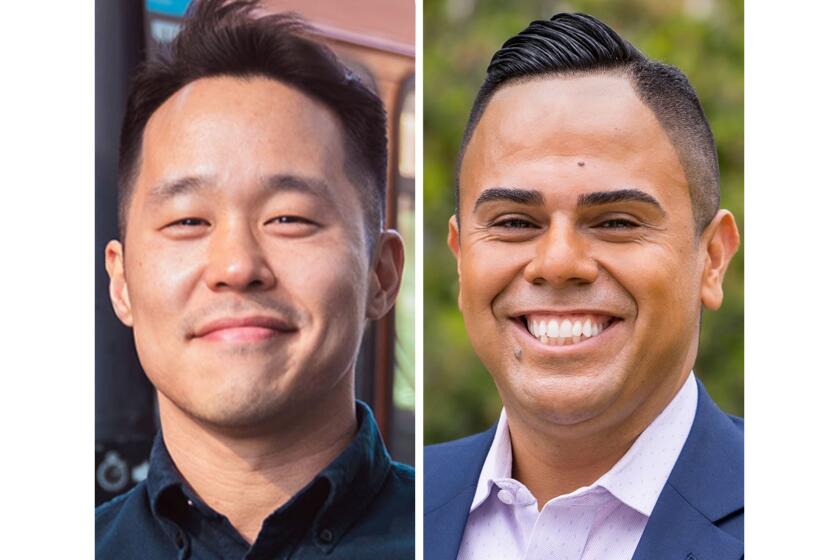Revive real debates
When Bob Schieffer begins the final presidential debate Wednesday, he will surely -- like moderators Jim Lehrer, Gwen Ifill and Tom Brokaw before him -- explain that the audience has promised to remain silent: “no cheers, no applause, no noise of any kind,” as Lehrer put it. This kind of respectful listening is standard fare today, but it is a far cry from the debates of the 19th century, when audiences were expected to offer raucous rejoinders and irreverent commentary.
Running for the Senate 150 years ago, Abraham Lincoln and Stephen A. Douglas faced off in a series of seven debates across Illinois, remembered to this day as among the most important in U.S. history. Each spoke in the open air for a total of 90 minutes, with no amplification to be heard above the jeering crowds.
The mass of spectators -- as many as 20,000 at the first debate in Ottawa -- responded to the orators as if they were prizefighters, urging their candidate to “hit him again,” “stick it to him,” “don’t spare him.” According to historian Harold Holzer, Douglas supporters even brought a brass cannon that they set off after he delivered an especially good verbal blow.
Not to be outdone, advocates for Lincoln pelted Douglas with a watermelon rind during his speech in Freeport and daubed his carriage with excrement at an unofficial stop in Danville. By the standards of this “smear campaign,” Swift-boating seems almost dilettantish.
Recognizing the tremendous appeal of such rough-and-tumble politicking, the orators themselves were not above trading insults with their audience. When an Ottawa spectator yelled to Lincoln, “You are a fool,” Lincoln responded, “I guess there are two of us that are that way.” Douglas frequently admonished his supporters for cheering too loud, thereby encroaching on his time. On one occasion, the crowd responded by bursting out, “We can’t help it!”
The two men used their wildly contrasting bodies and competing styles to create onstage personas. Lincoln, who was 6 feet 4, dressed the part of a modest rustic, while Douglas, who was reported by some to be only 4 feet 6 (modern biographers put him at 5 feet 4), was outfitted in a more opulent manner, known as “plantation style.” The two even joked about their physical differences; before the official start of the debates, Lincoln compared Douglas’ “round, jolly, fruitful face” to his own “poor, lean, lank” visage, to gales of laughter in Springfield.
The debates were important not just as a political milestone but as a cultural one, marking that moment when politics became a form of mass entertainment. After all, this was 1858, the same year P.T. Barnum was managing an international tour of his prize attraction, Gen. Tom Thumb. Thirty-three inches tall, the General often appeared on stage alongside one of Barnum’s “giants,” to the howling delight of large audiences. The debates between “Long Abe” and “Little Dug” -- as the two were often called in the press -- played to the same crowds.
(In fact, Lincoln and Douglas both had brushes with Barnum’s circle. Two years after the Great Debates, Douglas allegedly tried to kiss Lavinia Warren, a 32-inch beauty who later joined the Barnum troupe. Warren married Tom Thumb in 1863, and their honeymoon included a stop at the White House, where spectators relished the disparity in size between the tiny couple and President Lincoln. Lincoln is said to have commented, “God likes to do funny things; here you have the long and the short of it.”)
None of this, however, detracted from the seriousness of the debates or the politicians’ commitment to the great moral issue of the day: the future of slavery in the American territories. Lincoln and Douglas spent the greater part of the seven contests in exhaustive and intricate conversation on this topic, even as they fielded catcalls from the audience. Civic engagement and enjoying a good show were not mutually exclusive.
Perhaps that was the secret of the debates’ success. For all its entrenched partisanship and comedic hokum, the Lincoln-Douglas contest provided a deeply satisfying experience of political involvement because it allowed its audience uninhibited expression and a rich role in public life. The thousands in attendance at each debate -- sometimes rude, drunk or boisterous -- participated in an event at once entertaining and nationally significant; in the process they became deeply connected to the politicians, to the political process and to one another.
If America really wants an energized electorate, we should embrace the real legacy of Lincoln-Douglas. Brokaw moderating a staged “town hall” -- with its carefully selected audience and civil Q&A -- is not enough. What’s needed is an unpredictable and raucous environment that forces the candidates to respond extemporaneously to the audience as well as to each other. This might not dignify the debates, but it would do much to bring Americans back to an experience of politics as participatory, communal and fun.
Gillian Silverman is an assistant professor of English at the University of Colorado Denver.
More to Read
Get the L.A. Times Politics newsletter
Deeply reported insights into legislation, politics and policy from Sacramento, Washington and beyond. In your inbox three times per week.
You may occasionally receive promotional content from the Los Angeles Times.










